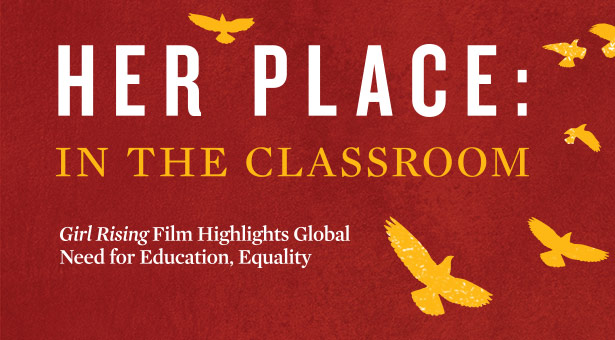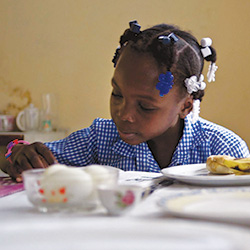
By Jeffrey Overstreet | Photos courtesy of 10X10 Media
“I’m told my mother burst into tears when she learned my sex. She set me aside in the dirt.”
Amina was born in Afghanistan, but no one made a record of her birth date. Only boys are given that kind of attention. At 11 years old, she was “sold” by her parents as a wife to her cousin for $5,000 — and then they gave the money to their son so he could buy a used car.
In the new documentary Girl Rising, Amina is one of nine girls who, with the help of writers from their nine different countries of origin, tell their stories of striving to obtain education in spite of poverty, abuse, slavery, and worse. The film made such an impression on students, faculty, and staff when it was featured during SPU’s Day of Common Learning in October 2013, that SPU’s Center for Scholarship and Faculty Development brought it back for another screening on January 28, 2014. Both screenings were done in partnership with Global Washington and First Free Methodist Church.
 Haiti's earthquake destroyed Wadley's school, but not her will to learn.
Haiti's earthquake destroyed Wadley's school, but not her will to learn.![]() View more photos
View more photos
It would be easy to lecture audiences with harrowing statistics about the importance of educating girls. But what viewers will remember most about Girl Rising are these specific girls — nine vibrant personalities, nine minds full of dreams, nine hearts full of hope — brought to us in colorful cinematography and elegant animation.
We meet Wadley of Port-au-Prince, Haiti, who refuses to let poverty prevent her from attending school after the earthquake; Suma, who suffers six years of indentured servitude while she dreams of singing; Yasmin, who fights back against a rapist, then runs to the police; Senna, named after Xena: Warrior Princess, whose dying father depends on her; and more.
SPU Professor of Geography Kathleen Braden was impressed with how the film made complex situations personal and engaging by letting girls speak for themselves. She was particularly affected by the story of a young girl in India who wanted to become an artist. “You expect her father to punish her,” she says, “but instead he nurtures her artistic side.”
Actor Liam Neeson is well-cast as the narrator — audiences will sense authority in the voice they associate with Narnia’s Aslan, not to mention a Jedi Knight, the Greek god Zeus, and the hero of Schindler’s List.
“Right now,” he intones, “there are 66 million girls out of school, and many more who struggle every day just to remain where they belong — in a classroom.”
Still, it shouldn’t take a movie star or special effects to make us care about this global crisis.
The urgent need for collective action is a day-to-day mission for Steve Haas, an SPU parent (his daughter Erin is a freshman) and vice president and chief catalyst for World Vision, one of the humanitarian organizations promoting and supporting the film. His work and research has convinced him that when women are denied education, whole communities remain mired in abject poverty.
Cynthia Briehl, World Vision’s national director of Women of Vision, told Haas that the education of women and girls is “the closest thing to a silver bullet in eliminating global poverty.”
But when Haas attended a crowded screening of Girl Rising in Tacoma, Washington, he was dismayed to find himself one of only three men in the crowd. He’d prefer to see whole communities — men and women alike — rallying for this cause.
“Once you see women and their husbands advocating, in their own communities, for girls like these who don’t have others standing up for them, you begin to see a global impact,” he says. “You see people’s minds begin to change. We at World Vision have seen that in our 1,600- plus area-development programs across the hundred countries in which we work.”
“So many issues of poverty correlate with girls’ education.”
While SPU Professor of Sociology Jennifer McKinney was pleased to see Girl Rising inspiring the SPU community, she’d like to see “a part two” that would do more to help audiences understand how they can help address these global challenges.
“Girl Rising is accessible to an American audience because it’s individualistic,” says McKinney. “It focuses on individuals who have particular family support, or particular individual motivation, but it doesn’t give you any broader sense of collective action or system change. This is a systemic problem. How do we make an impact systemically?”
Rising to that challenge in SPU classrooms, McKinney and other faculty members are inspiring students toward advocacy that can help address big-picture problems. Braden, who teaches “Introduction to Global Development,” tells her students that — whether they consider themselves feminists or not — they cannot understand global development without looking at gender inequality. “So many issues of poverty correlate with girls’ education,” she says.
In McKinney’s “Introduction to Women’s Studies” course, students learn about ways in which language, culture, history, and media can contribute to gender inequality around the world. They also learn about how change happens, which, says McKinney, “gives students a sense of hope and empowerment.”
“We cap the class at 35, with 10 or 15 people on a waiting list,” she says. “It’s a vibrant program.” Seattle Pacific’s women’s studies minor, in existence since 1997, has had a profound influence on students, sometimes igniting passions that become vocations. Kelsey Ryland ’08 says she took “pretty much all of the classes on gender that were offered at SPU.”
As a sociology major studying with McKinney, Ryland found a strong desire “blooming” within her to help women exercise their full autonomy. She helped found Sophia, a student club for gender equality. After leaving SPU, Ryland became a domestic violence advocate through Americorps for a few years; interned with the National Network to End Domestic Violence in Washington, D.C.; and worked with Legal Voice, an organization securing and protecting women’s legal rights in Washington state. She’s currently completing law school at Seattle University, continuing her focus on gender equality.
It’s rewarding work, but it isn’t easy. In D.C., Ryland faced difficulties in helping win reauthorization for the Violence Against Women Act, which provides resources for victims of domestic violence. The “insane partisan politics,” she says, “were just unreal.”
SPU senior Amanda Wyma — a political science and communication double major, with a minor in women’s studies — works as an intern for the foreign affairs caseworker in Senator Patty Murray’s Seattle office. There, she reads “heart-wrenching” letters from constituents, including immigrant women. “Some of the letters I read outlined painful stories of women who have come to the U.S. seeking educational or vocational opportunities that they were barred access to in their home countries,” she says. “It was really bizarre, at first, to read real stories, in women’s handwriting, about situations that we are also discussing hypothetically in the classroom.”
This connection between classroom study and community influence is why Braden is excited about her role as SPU’s representative to Global Washington, a network of local organizations promoting global development, which sponsored the Girl Rising screenings. “I think Girl Rising appeals to students because the stories aren’t all relentlessly grim. Some are very hopeful.”
We need hopeful visions like this “beautiful film,” says Haas. “With the amount of information that assaults us every day, it’s so easy to get discouraged, to turn a deaf ear to disturbing reports and say, ‘I’ll just wait for the return of Superman.’” But Jesus shows us how to respond differently, he says. “There is a huge need right now for advocates. We’ve forgotten that ‘incarnation’ means to reside with, to come and live alongside.”
This call for advocacy inspired Ryland to go to law school and pursue policy work. “If people of faith choose to ignore these issues,” she says, “well, that’s contrary to the gospel. That’s contrary to loving our neighbors. If we call ourselves Christians, we need to step up to the plate and care.”
Raise Them Up
SPU Professor of Sociology and Director of Women’s Studies Jennifer McKinney invites readers to join her in learning about challenges and opportunities facing girls and women around the world. She recommends these books and resources:
Books
- Monique and the Mango Rains by Kris Holloway
- A Thousand Splendid Suns by Khaled Hosseini
- Half the Sky by Nicholas Kristof and Sheryl WuDunn
- Persepolis by Marjane Satrapi
- Wives, Mistresses, and Matriarchs by Louise Williams
